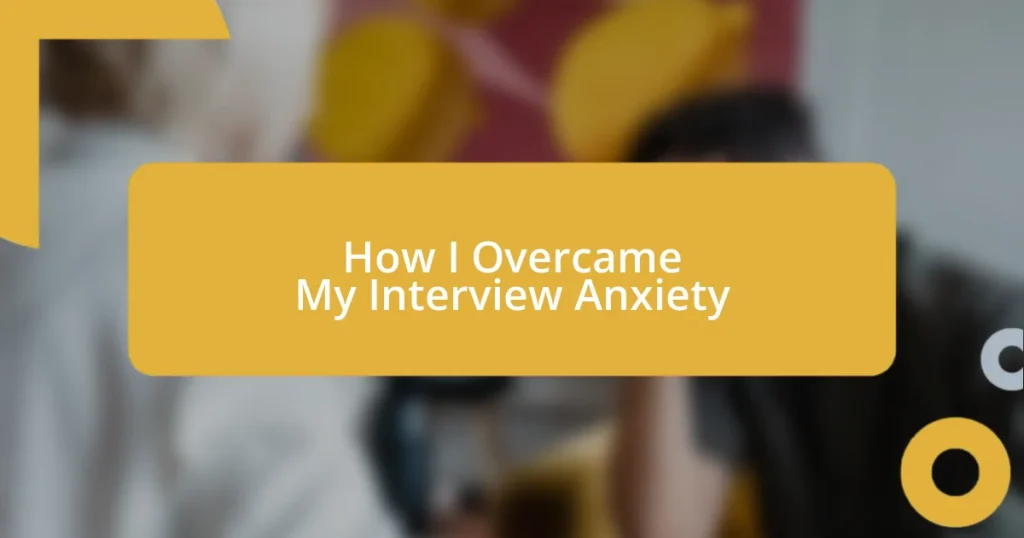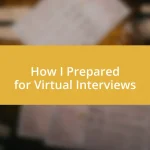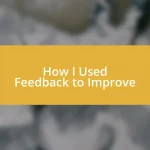Key takeaways:
- Acknowledging and embracing interview anxiety as a common experience can alleviate isolation and foster a sense of control.
- Preparing mentally through positive visualization, deep breathing, and acknowledgment of achievements boosts confidence and reduces anxiety.
- Reflecting on past experiences and keeping a journal helps transform anxiety into a learning opportunity, highlighting the power of preparation in overcoming fear.

Understanding Interview Anxiety
Interview anxiety can feel utterly overwhelming, often bubbling up at the most inconvenient times. I remember pacing back and forth in my living room the night before a crucial job interview, my mind racing with “What if I stumble over my words?” or “What if they don’t like me?” It’s fascinating how our thoughts can spiral when we’re facing such high-stakes situations.
For many, the fear stems from the pressure to perform perfectly and the uncertainty of being evaluated. I’ve often wondered: why do we let our minds conjure worst-case scenarios when there’s so much at stake? I learned that acknowledging these feelings is the first step to managing them; instead of suppressing the anxiety, I started to embrace it as a natural response.
Understanding that interview anxiety is a common experience can be comforting. I’ve connected with countless individuals who share similar fears—hearing that others struggle with the same feelings really helped me feel less isolated. The reality is that this anxiety speaks to our desire to succeed and be accepted, and recognizing it can give us a sense of control over our own narratives.

Identifying Your Triggers
Identifying your triggers is essential for overcoming interview anxiety. For me, it was about pinpointing the moments that set off that familiar pang of dread. I’d notice that specific scenarios, like a room full of confident candidates or intricate interview questions, would ramp up my anxiety. Recognizing these patterns offered me the chance to prepare mentally for what I could anticipate.
To help you identify your own triggers, consider these points:
- Environmental Factors: Do crowded or quiet spaces affect how anxious you feel?
- Social Interactions: Are there particular people or groups that boost your anxiety levels?
- Self-Perception: How do you feel about your abilities before stepping into an interview?
- Question Types: Are you particularly anxious about behavioral questions or technical ones?
- Time Pressure: Does the ticking clock heighten your sense of urgency and fear?
By acknowledging these triggers, I was able to create strategies for each situation, building my confidence and reducing that overwhelming sense of panic. The journey of knowing what gets under my skin also gave me a relatable perspective—it’s like having a cheat sheet for anxiety.

Preparing Mentally for Interviews
Preparing for an interview begins way before you step into the room. In my experience, engaging in positive visualization was a game changer. Picture this: I’d sit in a quiet corner, close my eyes, and imagine the entire interview going smoothly. With every detail I added—the interviewer smiling, nodding as I spoke—I felt a wave of calm wash over me. It’s incredible how our minds can create a calming oasis, even amidst chaos.
In addition to visualization, I found deep breathing exercises to be incredibly beneficial. During one particularly nerve-wracking interview, I felt the familiar clenching in my stomach. Instead of letting it take over, I took a moment to focus on my breath, in through the nose, out through the mouth. Suddenly, my thoughts slowed down. This simple practice helped ground me, reminding me that I could face this challenge one breath at a time.
It’s also valuable to remind yourself of your achievements. Before interviews, I would jot down my successes—big or small—on a sticky note and keep it in my pocket. The boost of confidence I felt from seeing my accomplishments in tangible form was empowering. It served as a little nudge to remind me that I’m capable, even when self-doubt creeps in.
| Strategy | Description |
|---|---|
| Positive Visualization | Imagining a successful interview experience to build confidence. |
| Deep Breathing | Breathing exercises to calm nerves and center thoughts. |
| Affirmation of Achievements | Writing down successes to boost self-esteem and combat self-doubt. |

Practicing Mock Interviews
Mock interviews can be a powerful tool for tackling interview anxiety. I remember the first time I sat down with a friend to practice—my heart raced just thinking about it. But as I settled into the process, I began to realize that simulating the interview environment helped demystify my fears. It turned out that facing the questions in a relaxed setting felt far less daunting than I had anticipated.
During our sessions, I encouraged my friend to throw some curveballs my way. This approach, albeit nerve-wracking, helped me prepare for unexpected questions that might pop up in a real interview. I vividly recall the day my friend asked me about a complex project I’d worked on, expecting me to stumble. To my surprise, having practiced in a mock setting made me articulate my thoughts clearly and confidently. It’s like preparing for a game—you don’t just practice the easy plays; you get ready for the surprising ones too.
Looking back, I truly believe that mock interviews were pivotal in building my confidence. Did I still feel a flutter of nerves on the day of my actual interview? Absolutely! But with every mock session, I could feel the panic starting to fade into a manageable buzz of excitement. Practicing in front of someone who provided constructive feedback not only honed my responses but also allowed me to embrace vulnerability, knowing that it was all part of the growth process.

Developing Relaxation Techniques
One of the relaxation techniques that truly transformed my experience was progressive muscle relaxation. I remember those anxious nights leading up to big interviews, tossing and turning in bed. Just before sleep, I’d tense each muscle group, starting from my toes and moving up to my shoulders. When I released that tension, the feeling was like letting go of a heavy weight. It grounded me and often prepared me for a more restful night.
Another method I found invaluable was the use of calming scents. I came across the idea of aromatherapy and decided to give it a shot. I started keeping a small essential oil roller in my bag, often lavender or chamomile, which I’d apply on my wrists just before walking into the interview. The familiar scent became a sort of trigger for relaxation, weaving itself into my routine. Have you ever experienced how a particular smell can transport you to a safe space? That’s exactly how it felt—I could take a deep breath and feel the nerves start to fade.
Incorporating gentle stretches into my routine also worked wonders. I’d spend a few moments before an interview doing simple neck rolls and shoulder shrugs. It’s amazing how loosening up physically can also calm the mind. I’d often think to myself, if I could just release that tightness in my body, maybe I could loosen the tension in my thoughts as well. This dual approach helped me approach interviews not just mentally prepared, but physically ready too.

Visualizing Success
Visualizing success became my secret weapon against interview anxiety. I started by finding a quiet space, closing my eyes, and imagining myself stepping confidently into the interview room. I could picture the interviewer’s smile and hear myself responding to questions with ease. This mental rehearsal was almost like watching my own personal highlight reel; the more I envisioned these scenarios, the more familiar they felt. Have you ever noticed how profoundly our minds can shape our experiences? It’s remarkable how visualizing success transformed my anxious thoughts into a vivid picture of what I wanted to achieve.
I often took this visualization practice a step further by incorporating positive affirmations. Phrases like “I am prepared and capable” echoed in my mind as I imagined nailing each answer. On days when self-doubt crept in, repeating these affirmations while visualizing my successful performance brought an unexpected surge of confidence. I began to associate these mental images with a sense of calm, almost like a comforting ritual. Honestly, I couldn’t believe how much a few moments of focused visualization could shift my entire mindset!
One of the most memorable moments came just before an important interview. I stood in front of a mirror and visualized not just the questions I’d be asked, but the excitement I’d feel after answering them successfully. As I spoke to my reflection, I felt the tension ebb away. It was as if I was giving a performance, and I was both the actor and the audience. How often do we overlook the power of our own minds in shaping our outcomes? I realized that visualizing success wasn’t just about preparing for the interview; it was about rewriting my own narrative and empowering myself.

Reflecting on Your Experience
Reflecting on my experience with interview anxiety revealed some surprising lessons. There were times when I replayed interviews in my mind, identifying those moments I felt particularly anxious. It became clear that acknowledging my feelings was a crucial step in processing them. Can you recall a time when you faced something challenging and decided to reflect on it instead of just pushing it away? I found that this reflection transformed my fear into a source of learning.
One of the most impactful moments came when I recognized a pattern in my anxiety—my lack of preparation. I remember approaching an important interview filled with dread, thinking I wasn’t ready. But after the interview, I took time to analyze my preparation methods. I knew that feeling unprepared added to my anxiety, so I started creating detailed plans for each interview. This realization made me wonder: how often do we underestimate the power of preparation in easing our worries?
Additionally, I began to keep a journal documenting my experiences. Writing down everything—from my feelings to the outcomes—not only provided clarity but also acted as a record of my growth. One entry stands out: after a particularly tough interview, I wrote about what went well and where I could improve. It was cathartic to see my progress laid out in front of me. Have you ever thought about how journaling could help you uncover insights about your own challenges? I found that while I still experienced anxiety, reflecting on my journey made it manageable, transforming fear into a catalyst for personal growth.















